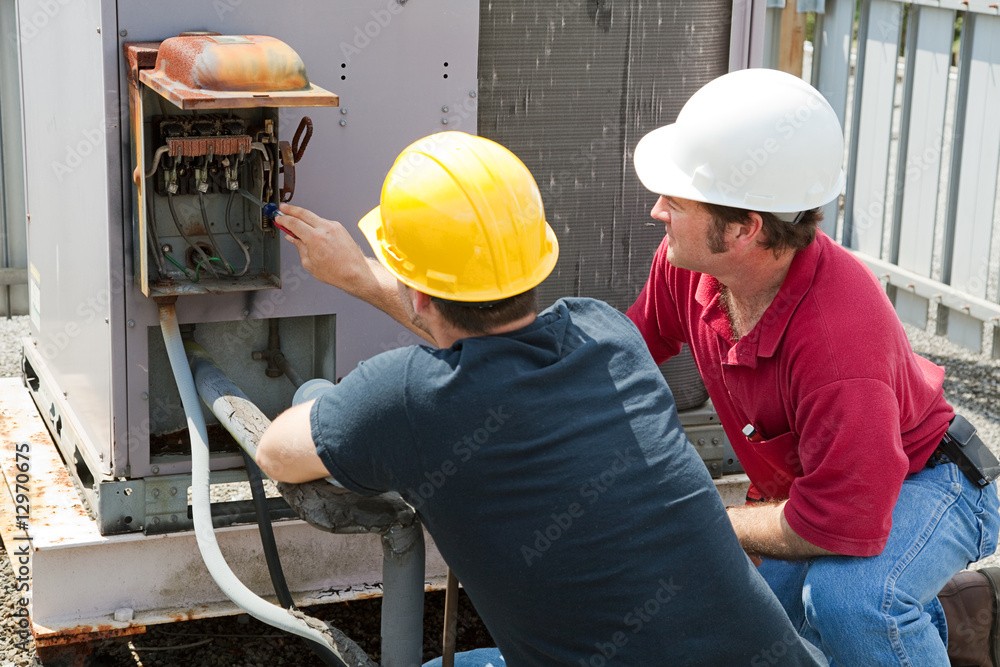Are you considering a career in the Heating, Ventilation, and Air Conditioning (HVAC) industry? Understanding the potential earnings is a crucial first step. A common question among aspiring technicians is: “How much do HVAC professionals make?” This guide provides a detailed overview of HVAC salaries, focusing on factors like experience, location, and specialization.
According to the Bureau of Labor Statistics (BLS), the median salary for HVAC technicians is around $51,390 per year, or $24.71 per hour. However, this figure represents experienced technicians. Entry-level positions, such as apprenticeships, offer a lower starting point but provide invaluable training and experience. Let’s explore the earning potential at various stages of an HVAC career.
What is an HVAC Apprenticeship?
An HVAC apprenticeship is a structured training program that combines on-the-job learning with classroom instruction. This approach allows aspiring technicians to develop the practical skills and theoretical knowledge necessary for success in the field. Apprentices work under the guidance of experienced mentors, gradually taking on more responsibilities as they progress through the program.
 HVAC apprentice working on a unit
HVAC apprentice working on a unit
Apprentices typically spend three to five years in this training phase before advancing to more senior roles. Common responsibilities of an HVAC apprentice include:
- Assisting experienced technicians with maintenance and repairs
- Installing and repairing HVAC systems
- Testing and servicing parts and components
- Replacing refrigerants
- Performing electrical and electronic connections
- Maintaining records of work performed
In addition to hands-on training, apprentices attend classroom sessions covering topics such as math, heating and cooling principles, energy transfer, and HVAC applications. The combination of practical experience and theoretical knowledge equips apprentices with a comprehensive understanding of HVAC systems.
HVAC Apprentice Salaries: Breaking Down the Numbers
HVAC apprentice salaries vary based on experience level, location, and industry. Generally, apprentices earn less than experienced technicians, but the compensation increases as they gain skills and knowledge.
Average Salary and Pay Scale
Data from Zippia.com indicates that the average salary for HVAC apprentices is $34,073 per year, with a typical range of $26,000 to $43,000. Talent.com reports a slightly higher average of $37,451 per year. Entry-level positions typically start around $32,175 annually, while more experienced apprentices can earn up to $50,331 per year.
Hourly Pay Rate
On an hourly basis, Zippia.com estimates the average rate for HVAC apprentices at $16.38. Talent.com reports an hourly rate of $18.01. These figures provide a general idea of what apprentices can expect to earn, but the actual pay rate can vary depending on the specific employer and location.
Salary by Industry
The BLS identifies wholesale and retail trade, educational services, and contracting companies as offering the best compensation for HVAC professionals. Apprentices working in these industries may find higher earning potential compared to those in other sectors.
Salary by Location
Location significantly impacts HVAC apprentice salaries. The table below shows the average annual and hourly wages for HVAC technicians in each state, providing insights into regional variations:
| State | Average Salaries per year | Mean Wages per hour |
|---|---|---|
| Alabama | $47,200 | $22.69 |
| Alaska | $72,200 | $34.71 |
| Arizona | $54,390 | $26.15 |
| Arkansas | $45,560 | $21.91 |
| California | $67,430 | $32.42 |
| Colorado | $59,370 | $28.54 |
| Connecticut | $68,930 | $33.14 |
| Delaware | $56,920 | $27.37 |
| Florida | $49,390 | $23.74 |
| Georgia | $52,430 | $25.21 |
| Hawaii | $71,310 | $34.29 |
| Idaho | $49,160 | $23.63 |
| Illinois | $62,730 | $30.16 |
| Indiana | $56,120 | $26.98 |
| Iowa | $54,700 | $26.30 |
| Kansas | $54,270 | $26.09 |
| Kentucky | $50,810 | $24.43 |
| Louisiana | $52,880 | $25.42 |
| Maine | $56,340 | $27.09 |
| Maryland | $63,280 | $30.42 |
| Massachusetts | $70,010 | $33.66 |
| Michigan | $57,090 | $27.45 |
| Minnesota | $70,080 | $33.69 |
| Mississippi | $45,310 | $21.79 |
| Missouri | $60,270 | $28.98 |
| Montana | $53,180 | $25.57 |
| Nebraska | $54,190 | $26.05 |
| Nevada | $56,410 | $27.12 |
| New Hampshire | $61,660 | $29.64 |
| New Jersey | $68,510 | $32.94 |
| New Mexico | $48,160 | $23.16 |
| New York | $69,540 | $33.43 |
| North Carolina | $49,380 | $23.74 |
| North Dakota | $63,720 | $30.63 |
| Ohio | $55,950 | $26.90 |
| Oklahoma | $49,050 | $23.58 |
| Oregon | $61,860 | $29.74 |
| Pennsylvania | $55,380 | $26.62 |
| Rhode Island | $62,580 | $30.09 |
| South Carolina | $48,170 | $23.16 |
| South Dakota | $55,650 | $26.76 |
| Tennessee | $49,820 | $23.95 |
| Texas | $51,790 | $24.90 |
| Utah | $53,580 | $25.76 |
| Vermont | $55,730 | $26.79 |
| Virginia | $55,880 | $26.87 |
| Washington | $65,340 | $31.41 |
| West Virginia | $44,060 | $21.18 |
| Wisconsin | $64,250 | $30.89 |
| Wyoming | $56,530 | $27.18 |
Note: This table reflects salaries for HVAC technicians, not specifically apprentices. Apprentice salaries will typically be a percentage of these figures.
Salary by Experience
Experience plays a crucial role in determining HVAC salaries. HVAC supervisors with 7+ years of experience can earn a median salary of $88,600, while technicians with less than three years of experience average around $36,171 in the construction industry.
HVAC Apprentice Skills and Specialties
While all apprenticeships start with basic HVAC training, specializing in a particular area can significantly impact earning potential. Some common HVAC specializations include:
- System design
- Duct design and repair
- Customer service
- Cost estimation and inventory management
- Electrical and automation
- Testing and air balancing
- General repair and maintenance
- Installations
- Sales
Developing strong skills in areas like customer service, math, mechanical literacy, and troubleshooting can also contribute to career advancement and higher salaries.
Pros and Cons of an HVAC Career
Choosing a career path requires careful consideration of both the advantages and disadvantages. Here are some pros and cons of pursuing an HVAC career:
Pros:
- High demand for HVAC professionals
- Variety of work environments (residential, commercial, industrial)
- Opportunities for continuous learning and skill development
- Competitive salaries and potential for advancement
- Job security and transferable skills
- Independence and responsibility
Cons:
- Physically demanding work
- Apprenticeships can last 3-5 years
- Potential for long hours and on-call work
- Need to stay updated with evolving technology
Conclusion
An HVAC apprenticeship can be a rewarding path to a stable and well-paying career. While apprentice salaries may be lower initially, the investment in training and skill development can lead to significant earning potential over time. Factors such as location, experience, and specialization all play a role in determining how much HVAC technicians make. By carefully considering these factors and pursuing relevant training and certifications, aspiring HVAC professionals can maximize their earning potential and build a successful career in this in-demand field.
HVAC technicians are in high demand for their expertise in maintaining and repairing heating and cooling systems in residential and commercial settings.
FAQs
Do HVAC Apprentices Get Paid?
Yes, HVAC apprentices typically receive compensation for their work, earning a salary or hourly wage while gaining valuable on-the-job experience.
Can HVAC Apprentices Expect Pay Raises?
Yes, pay raises are common as apprentices progress in their training and acquire new skills, reflecting their growing expertise and contributions.
What Factors Affect HVAC Apprentice Wages?
Factors influencing wages include experience level, location, employer, and the demand for HVAC professionals in the market. Formal training programs and specialized skills can also lead to higher wages.
How Can I Find HVAC Apprenticeship Programs in My Area?
Explore local HVAC companies, trade schools, unions, online job boards, and industry associations to find apprenticeship opportunities in your area. Networking with HVAC professionals and attending career fairs can also be beneficial.
